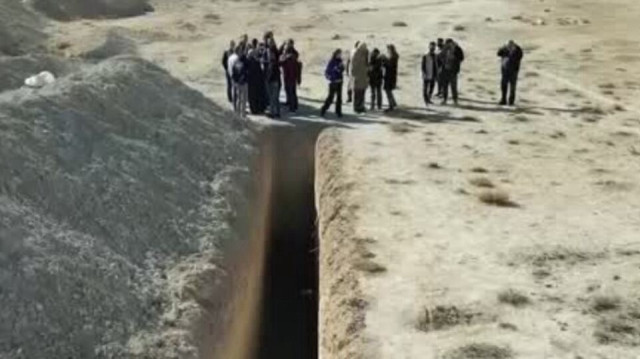
International lawyer warns about non-experts interfering with mass graves in Syria after fall of Baath regime
Since the fall of the Baath regime in Syria, mass graves uncovered almost every day in various provinces and regions of the country, especially in Damascus, await examination by experts.
Uveys Al-Dabish, a senior international lawyer at Global Rights Compliance (GRC), explained to Anadolu about the mass graves uncovered, procedures that should be followed and the preservation of documents after the fall of the regime.
Al-Dabish emphasized that the removal of bodies from the graves and identifications, uncovered as part of search and recovery efforts is a "difficult and dangerous" task.
He pointed out that mines may have been placed in those areas, so excavation should be done by professional teams.
"I don't think Syria currently has any capacity to exhume these bodies," Al-Dabish assessed, noting that the process could be carried out in coordination with NGOs.
He said identifying the victims or locating them is a long process and pointed out the need for international expert support.
Al-Dabish warned that non-experts should not interfere with the graves, where the remains of civilians believed to have been killed by the Bashar al-Assad regime are found.
"Please be careful, do not touch the mass graves or documents. If you're not ready to do this or don't have the capacity, consult experts," he said.
- 'Archives crucial for understanding what happened'
Al-Dabish, who left Damascus in 2013 and visited his country for the first time after the regime's fall, noted that after arriving in Damascus, he conducted field visits to some security facilities.
He observed that many people were trying to collect documents without any security assessment.
"I know everyone is excited, but I believe this process should be more organized and carried out by well-trained people," Al-Dabis said, noting that in some facilities he visited, all documents and belongings were scattered on floors.
Al-Dabish warned inexperienced individuals who do not know how to deal with mines or munitions to be cautious about potential traps they may encounter.
He emphasized that every step taken and every document collected should be recorded, as the documents should be used for accountability of crimes committed or for locating the missing.
"These archives are very important for understanding what happened in Syria," Al-Dabish stated.
- Fall of 61-year-old Baath regime in Syria
On Nov. 27, clashes intensified between anti-regime armed groups and Assad's forces.
Anti-regime armed groups gained control of the major cities, including Aleppo, Idlib, Hama and Homs, between Nov. 30 and Dec. 7.
On Dec. 7, as the groups began entering Damascus, they received support from the public, and the regime completely lost control in Damascus and other areas. The capital collapsed Dec. 8.
The Baath Party's 61-year rule came to an end, and Assad fled to Russia on Dec. 8, where he arranged asylum for himself and his family.
Meanwhile, the Syrian National Army freed the town center of Tel Rifaat from the PKK/YPG terror group on the first day of the "Dawn of Freedom" Operation, launched in December.
With the liberation of Manbij, the region, which had become the largest terror stronghold west of the Euphrates River, was cleared of PKK/YPG.
After the fall of the Baath regime, a temporary government was established in Syria, and Mohammed al-Bashir was appointed prime minister of the government until March 2025.
Türkiye's Embassy in Damascus also resumed operations Dec. 14.
After the collapse, many Western countries sent delegations to Damascus.

